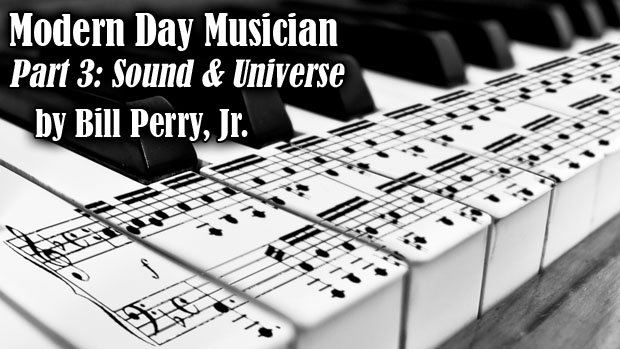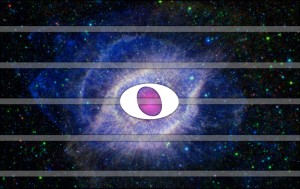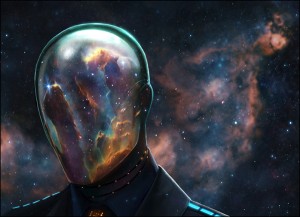
 BANG! The nucleus of life spreads its cosmic wings throughout; the universe is forming; celestial bodies begin to form sometime after. Every tone and pitch imaginable, and perhaps unimaginable, binds together to become the “first whole-note” echoed throughout the universe, thus becoming The Divine Whole-Note from which all tones are derived! The relevance of sound in the universe is felt in the spirit of music. The “glow” you feel when a note passes through a chord that “jerks your soul,” or that harmony that brings tears to your eyes, or rhythmic patterns that can induce a trance; to whereas there is nowhere to go but to follow the drum. Even a single voice that oozes a sincere mood and beauty can leave you in awe of what you’re hearing, or perhaps a symphony so moving you realize you have been “touched” by something special that we cannot explain when we feel it, yet we can all easily relate with the many sensations we feel when we hear music that moves us.
BANG! The nucleus of life spreads its cosmic wings throughout; the universe is forming; celestial bodies begin to form sometime after. Every tone and pitch imaginable, and perhaps unimaginable, binds together to become the “first whole-note” echoed throughout the universe, thus becoming The Divine Whole-Note from which all tones are derived! The relevance of sound in the universe is felt in the spirit of music. The “glow” you feel when a note passes through a chord that “jerks your soul,” or that harmony that brings tears to your eyes, or rhythmic patterns that can induce a trance; to whereas there is nowhere to go but to follow the drum. Even a single voice that oozes a sincere mood and beauty can leave you in awe of what you’re hearing, or perhaps a symphony so moving you realize you have been “touched” by something special that we cannot explain when we feel it, yet we can all easily relate with the many sensations we feel when we hear music that moves us.
I believe that every note and chord in existence has an imprint from The Divine Whole-Note, which makes music so special and moving to our souls—an “inner connection,” if you will—or spiritual knowledge of The Divine Whole-Note. This is somewhat similar to the Socratic philosophy that we are all born with an innate knowledge about the world and the universe around us. According to Socrates, all we need is to be taught or shown this knowledge that dwells within us. Using this philosophy as a reference, I believe that “special something” we feel when we “harness” these notes from our voices and instruments, as well as our minds and souls, is a reflection of our connection to the knowledge of The Divine Whole-Note, because of that divine connection music has to the universe through sound. And we bring these sounds together to produce expressions of various moods and emotions that are essential to our humanistic needs. But we must also remember the whale’s mating calls and musical foreplay in our vast oceans and even the cricket’s mating music, as well as the birds in our skies and trees with their birdsongs, and many other types of species that utilize sound as a way of expressing themselves. When the worker bee, for example, returns to the beehive, it begins a lovely “ballet” that describes the location of potential honey in a particular location (all expressed through certain buzzing sounds and patterns with the wings) and a “dance” that indicates the location of that species main concern: honey!
Using that last statement as a reference to the usage of sound and music in a modern-day society, perhaps music has become a “martyr” to our “bottom-line” factor as people: money! But be careful not to take this out of context, because in these modern times you cannot survive as a career musician without making money to maintain a stable lifestyle. Gigs for unknown musicians can be very scarce, because they are not well known or consistently performing lucrative shows like a long-staying engagement at a club or concert hall that hires musicians for a period of time and pays them a consistent salary (unions scales, etc.)
 This is why a musician’s journey can be perplexing at times, because some musicians who would like to manifest into “artists,” but must also be willing to make sacrifices in their lives to support their art, get into situations where “art” is not asked of them, but rather to “profit,” which is of course a shrewd but rational business approach to music, especially when it comes to the topselling hierarchy of the music business—like Madonna,Michael Jackson, 50 Cent, and so on. If you as an artist/musician are put in a situation where you feel you’ve become “spiritually detached” from music, it’s time to reevaluate your reason and purpose with music! That is the goal of the musicianist—to maintain respect and humility for music as well as sharing all the beauty you can harness from music with as many souls as possible!
This is why a musician’s journey can be perplexing at times, because some musicians who would like to manifest into “artists,” but must also be willing to make sacrifices in their lives to support their art, get into situations where “art” is not asked of them, but rather to “profit,” which is of course a shrewd but rational business approach to music, especially when it comes to the topselling hierarchy of the music business—like Madonna,Michael Jackson, 50 Cent, and so on. If you as an artist/musician are put in a situation where you feel you’ve become “spiritually detached” from music, it’s time to reevaluate your reason and purpose with music! That is the goal of the musicianist—to maintain respect and humility for music as well as sharing all the beauty you can harness from music with as many souls as possible!
A musicianist must also be careful when it comes to what is really important about creating music in its simplest form; that is, getting beyond financial gain and/or stability and fame (although most musicians claim they don’t want the fame and fortune—right!) A musician who performs live in clubs, venues, theaters, stadiums, and arenas on a regular basis would be lying to you if they proclaimed they did not like adoration for their work. Why make it public domain if you don’t seek a little adoration for your music? Just look at MySpace.com—everybody’s an “artist” of some kind (music, literature, producers, visual artists, models, poets, dancers, etc.) And some who make this claim (in particular the musicians and music artists) only do so to seek attention and hopefully to impress you with a “slick” recording that gives the illusion that they have “talent” and should be taken seriously. I call this the “curse of home-studio computer software and keyboard workstations.” Pro-Tools, Logic, Reasons, Cakewalk, and more, have made—not intentionally or by any fault of their own—some people who have purchased them feel as though they’re “Beethoven incarnates” or “the new Miles Davis.” They are “musical geniuses” who have harnessed the power of The Divine Whole-Note through “cutting and pasting” presets or downloaded sounds from various other sources!
But let me be clear on this issue, considering I’m from the hip-hop generation in which music was founded on the principle of sampling, cutting, and pasting music together through break-beats and so on, there is nothing wrong with these programs or the capabilities they provide for the musician to expand their musical horizons—what I assume these programs were designed for—but learning how to operate these programs and creating “soul-less music” can be felt by those who know and feel pseudo-art when they hear it. I do not have any particular artists or musicians in mind, as I assume you may think I do, I’m just making the point that when music is “empty” or devoid of emotion, you can sense that lack of connection to your soul, sound twisted from its original design and origin, The Divine Whole-Note, into something that is reconfigured through “nothingness” into supposed plausible music.
The only problem with this particular summation I’ve made is my belief that ALL sound, regardless of shape, form, or fashion, is a by-product of The Divine Whole-Note, therefore making ALL music, in a matter of speaking, divine by nature and design, thus making all sounds used for musical expression worthy of acceptance, and perhaps even praise and adoration. But be wary of this, my fellow musicianist! The modern-day musician must be more in command behind the power of their music, and should only seek to entertain, uplift, inspire, and enlighten!
All other goals are more “self-oriented,” such as fame and fortune, or even just financial stability for a working musician, and have nothing to do with the goal of music in its purest form; for it is without purpose, until we give it shape and form, and make it more spiritually tangible whereas we give it a destination from which to start, and a resolution to reach the omega phase (the end of a song) in a piece of music, unless a song fades-out into infinity.
I personally love fade-outs in music, because it can sometimes give the song a new allure every time you listen to it. For example, as I write these words, I’m listening to “Come Live With Me, Angel” by the late soul-stirring angelic singer Marvin Gaye, and that song ends with a fade-out. And I “see” and feel different “resolutions” every time I hear it. Understand my meaning? Some composers and music educators believe that when a song fades out, it’s “musical laziness” on the part of the songwriter, because it supposedly indicates he/she had no definitive idea about how to end it, so they “cop out with a fade-out”!
This is not true, because sometimes a song’s true essence and meaning cannot be contained in a set amount of bars or measures; it may have to extend beyond relative time and immerse itself back into the hands of its mother—you guessed it—The Divine Whole-Note! Songs that fade have a feeling of eternalness in motion, because when the fading is complete, it becomes a part of the omega phase—an absolution!
 The most divine characteristic about music is its continuing perpetual cycle of birth and rebirth, and what I mean by this is every song can always be performed and heard over and over, bringing about a multitude of various interpretations on its shape and form, even perhaps bringing new light to a song that was once in “purgatory,” only to find itself being rediscovered by musicians and listeners who have felt its glow and want the world to feel the same. Music Observatories and various music schools in colleges around the world educate millions of students about music created hundreds of years ago; the music is timeless and therefore continues to be a shining light in modern times. No one alive today ever met Bach, Haydn, Mozart, Beethoven, or Schubert, but we are familiar with their music, even if not by name. Their music still lives on, and will continue to live as long as humans exist! This gets into the themes of my final chapter in the Modern-Day Musician series entitled “Music and Immortality.”
The most divine characteristic about music is its continuing perpetual cycle of birth and rebirth, and what I mean by this is every song can always be performed and heard over and over, bringing about a multitude of various interpretations on its shape and form, even perhaps bringing new light to a song that was once in “purgatory,” only to find itself being rediscovered by musicians and listeners who have felt its glow and want the world to feel the same. Music Observatories and various music schools in colleges around the world educate millions of students about music created hundreds of years ago; the music is timeless and therefore continues to be a shining light in modern times. No one alive today ever met Bach, Haydn, Mozart, Beethoven, or Schubert, but we are familiar with their music, even if not by name. Their music still lives on, and will continue to live as long as humans exist! This gets into the themes of my final chapter in the Modern-Day Musician series entitled “Music and Immortality.”
In conclusion, I feel obligated to explain my mixture of spiritualism, mysticism, cosmology, and Christianity as the backbone of my concept and philosophy of being a musicianist, a term I’ve coined as another way of saying you’re a spiritual musician who believes music is divine by nature, but also believes music should not be confined only to the church but rather expressed to all people to hear, feel, and enjoy! To understand how divine music truly is, picture this world without it. Take a moment right now and imagine a world with no music, sounds with no meaning or purpose.
Very depressing and dismal, yes? That is why music is a divine entity, because a world without music, especially for humans, is a very gloomy and uninspired world indeed!
Music brings forth beauty, divinity, ecstasy, and even salvation for some, all of which have the same aftertaste—bliss!
You may have noticed this chapter in my Modern-Day Musician series deals more with the philosophy of a self-proclaimed musicianist. If in time this philosophy becomes known to the public, I want a chapter that deals with the spiritualism of a musicianist, and can perhaps prove to be worthy virtues and beliefs! I also want the ideas that motivate anyone claiming to be a musicianist after reading my manifesto to mirror the philosophy I’ve just discussed.
Musicianism is a philosophy and a way of life, nothing more, nothing less! It is not a fraternity or some nouveau music society. Nor is it some kind of new radical religious sect that believes music is God, although the roots of music do stem from a divine connection, I do not believe music in itself is God, so don’t get it twisted! But I must say, a spiritual crusade has begun to bring musicianism into the mainstream and consciousness of the world!
If you will allow me this indulgence for a moment, I equate musicianism to any other philosophical or ideological position about life and the world we live in, such as Ralph Waldo Emerson and Transcendentalism, or Friedrich Nietzsche and his Existentialistic views of the world around us.
Musicianism’s only concern is the power of music and the impact it has in our lives, and how significant and extremely relevant sound is in our universe. It makes me think of that famous scene at the end of Steven Spielberg’s film Close Encounters of the Third Kind where the keyboardist and the aliens had this inter-galactic jam session that broke through language barriers. Although it was just a scene in a fictitious movie, I like the idea that regardless of what “world” you come from, music will always connect us—a musicianistic outlook, if you will.
The musicianist is a humble disciple and servant to the art of music and sound. A musicianist’s mind, body, and soul are utilized as cosmic conduits in a sense, in the everlasting pursuit of creating music; whether it’s “good” or not depends upon the listener. Once the music is released from within you and some transcendental connection is made with other people through your music by entertaining, uplifting, inspiring, and enlightening them, you have done your duty as a musicianist in allowing this divine connection to transpire through your creation.
Harnessing sounds from a divine source and constructing a body of music that has moved someone’s soul is a grand event not to be taken lightly! It would be best to describe a musicianist as someone who could exist in various musical worlds and settings, and still respect whatever musical groups and/or societies they may be a member of, and have a musicianistic philosophy that music is divine. The Divine Whole-Note was spawned from sound that extends back to the beginning, before time was time—Alpha! I leave you with this Nietzsche quote I came across that I think is very relevant to this chapter: “Life without music would be a mistake.”
I bid adieu, fellow musicians.
–
This article was originally printed in two parts, in The Local Voice #50 (published March 20, 2008) and The Local Voice #51 (published April 3, 2008).
–


